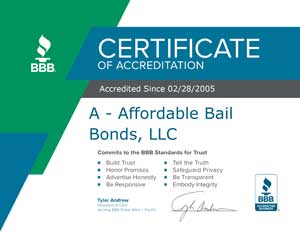Bail Collateral: Types of Collateral and Return Process
When a person is arrested, he or she may be required to pay bail. This amount ensures that the individual will appear at his or her court hearing. If he or she cannot pay the full bail amount, a bail bond agent will put up the bail in exchange for collateral. The bail bondsman can then seize the collateral assets if the defendant does not show up in court.
Types of Bail Collateral
Any item of value can serve as bail collateral when a person starts the process of obtaining a bail bond. The defendant or his or her family members can provide jewelry, the deed to a home or vehicle, or other property of the appropriate value. In the case of small items, the bail bond agent will take possession of the collateral and secure it until after the court case. For larger items, the bail bond company will hold the pink slip or deed until the case has ended.
Return of Collateral
The defendant can reclaim the collateral when the court discharges the bail bond, drops the charges, sentences the defendant, or finds him or her innocent. The contract with the bail bondsman will indicate the return date for collateral, usually within five business days of the trial resolution, provided the person pays all outstanding obligations. Usually, the bail company keeps a percentage of the collateral value as the agreed-upon fee.
Seizure of Collateral
If the defendant fails to appear in court, he or she forfeits bail. In this case, the court will collect on the full bail amount from the bail bond agent. The bail bond company will seize and sell the collateral to cover the amount in question.
Individuals and families who need the help of a bail bond agent can trust the service and professionalism of A-Affordable Bail Bonds. Clients in Vancouver, WA and surrounding areas can reach us at (360) 699-3100 or request bail through our secure online form.




